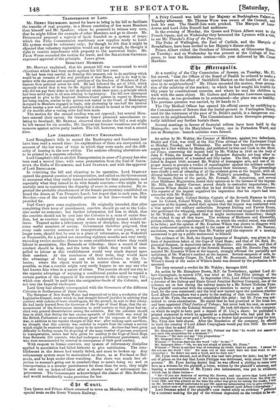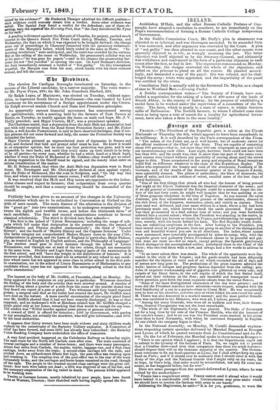gbe Metropolis.
At a meeting of the City Commission of Sewers, on Tuesday, Mr. El- liot moved, " that the Officer of the Board of Health be ordered to make a special report on the effect of Smithfield Market on the health of the citi- zens in its neighbourhood." Mr. Dixon seconded the motion, from persua- sion of the salubrity of the market; in which he had sought his health for fifty years by constitutional exercise, and where he sent his children to walk with the same object. Mr. Godson and Alderman Lawrence opposed the motion, as too groundless to be entertained—the place was so healthy. The previous question was carried, by 20 hands to 7.
The City Medical Officer has opened his official career by certifying to the Commissioners of Sewers that the burial-ground in Farringdon Street, used for the interment of the poor of St. Bride's parish, is a dangerous nui- sance to its neighbourhood. The Commissioners have thereupon peremp- torily inhibited any further burials there.
Several meetings in favour of financial reform have been held in the Metropolis; one by the Marylebone Vestry, one in Portsoken Ward, and one at Brompton: branch societies were formed.
An action by Mr. Wakley, the Coroner of Middlesex, against two defendants, Healey and Cook, was tried at the Nisi Prins sittings of the Exchequer Court on Monday, Tuesday, and Wednesday. The action was brought to recover da- mages for a libel written by Healey, and published by him and Cook in the Medi- cal Times, concerning the inquest held by Mr. Wakley in 1846 on the body of John F. White, the hussar who died at Hounslow Barracks not long after re-
ceiving a punishment of a hundred and fifty lashes. The libel, which was_lished in August 1846, accused Mr. Wakley of demagogue arts, and use of
proper means to procure a verdict or manslaughter against the military authori ties—of tampering with witnesses to influence their testimony. The pro
were chiefly a sort of rehearing of all the evidence given at the inquest, with a - ditional testimony as to the mode of Mr. Wakley's proceeding. The Reverend Mr. Trimmer, Rector of the parish, Mr. Pownall, Mr. Armstrong, and several other Middlesex Magistrates, stated their opinion as to the fairness of the inquest. Mr. Mills, the Deputy Coroner, proved details to contradict imputations ; Mr. Erasmus Wilson denied on oath that be had divided his fee with the Coroner. The reporter of the inquest negatived the imputation that his report had been concocted with Mr. Wakley.
On the other hand, Colonel Shirley, Captain of the Seventh Hussars in 1846, now its Colonel, Colonel Whyte, then Colonel, and Sir David Baird, a casual spectator at the Inquest, stated their opinion that the inquest was conducted with a bias against the military authorities. Sergeant Darling and Farrier Evans, who performed the whipping, stated that their evidence was stopped in the middle by Mr. Wakley, on the ground that it might incriminate themselves; though they wished to say all they knew. The evidence of Matheson and Elsworthy, private soldiers, the companions of White, on which the verdict rested, was stated to be false; and the opinion of Mr. Erasmus Wilson was shown to disagree with other professional opinion in regard to the cause of White's death. Mr. Ramsey, auctioneer, was called to prove that Mr. Wakley paid the expenses of a meeting summoned to get up a public testimonial to himself.
The evidence of Dr. Hall, the Deputy Inspector of Hospitals, was given in the form of depositions taken at the Cape of Good Hope; and that of Dr. Reid, Re- gimental Surgeon, in depositions taken at Mauritius: this evidence, and that of Dr. Warren, formerly surgeon of the Seventh Hussars, and Mr. Horatio Day, who assisted Mr. Erasmus Wilson at the inquest, strongly affirmed the partiality and unfairness of Mr. Wakley's conduct at the inquest. Several surgeons of note, in- cluding Mr. Bransby Cooper, Dr. Todd, and Mr. Beaumont, declared that Mr. Wilson's theory of the cause of White's death was deemed by the profession to be unsound.
The Jury returned a verdict for Mr. Wakley; damages 3501.
An action by Mr. Humphrey Brown, M.P. for Tewkesbury, against Lord Al- bert Conyngham, to recover 3701., was tried at the Nisi Prins sittings of the Queen's Bench on Wednesday. In September 1845, Lord Albert Conyngham was a director of the Galway and Ennis Grand Junction Railway Company, one of the schemes set on foot during the railway mania by a Mr. Robert Nicholas Fynn. The plaintiff contracted with the company's directors to survey a part of their road, for the sum mentioned; and the trial now turned upon the question whether Lord Albert Conyngham was a party to the making of that contract. The evi- dence of Mr. Fynn, the secretary, established this point; but Mr. Fynn was sub- mitted to cross-examination. He stated that he had practised at the Irish bar, and been appointed Chief Justice of Tobago; • but never took his seat, on account of a difference with the Colonial Secretary. He took 500 shares in this company, on which he ought to have paid a deposit of 21. 15s.: a share: he published a printed statement in which be appeared as a shareholder who had paid his de posit, though he had never paid a farthing—a broker had promised to pay for him. Mrs. Fynn also held shares. After the dissolution of the company, he offered to leave the country if Lord Albert Conyngham would pay him 2001. He would not deny that he asked 3651. Mr. Sergeant Shee—" And did not Mr, Palmer say that he would not assent to any such vile proposition for a moment ?' " Witness—" He dare not say vale proposition.' "
Mr. Sergeant Shee—" Why not ?"
Witness—" No man dare use the word 'vile' to me ! "
Mr. Sergeant Shee—" Oh, we are not afraid of pistols, Mr. Pynn." Witness—" There is another way of resenting an insult than by pistols. I swear he did not use the word • vile.' No man out of this court dare use that word to me. (Laughter.) He didn't use such a word, and he dare not."
Mr. Fynn went abroad, and at Paris was cast into prison for debt; but he "got out of prison on the day that Louis Philippe was dethroned, with about 750 more persons." Mr. Fynn having denied that he was offered a shilling to come over here as a witness for the plaintiff, a letter, written by the plaintiff's attorney, and bearing a memorandum of Mr. Fynn's own indorsement, was put in evidence, which ran in these terms-
" Sir—If you are desirous of serving Mr. Brown, and can prove that Lord Albert Conyngham acted as Chairman of the ordway and Ennis Junction from the 27th Oc" tober 1845, and was present at the time the order was given for taking the traffic. I will on Mr. Brown's behalf undertake to pay 20e. upon my subptenaing you to give evidence, and a further sum of 301. upon obtaining a verdict against Lord Albert Conyngham." Lord Denman asked if the plaintiff's case rested solely on evidence " pollute". by a contract making the pay of the witness dependent on the verdict to be ob- tamed by his evidence?" Sir Frederick Thesiger admitted his difficult position- ench evidence could scarcely obtain him a verdict. Some other evidence was called. The Special Jury found a verdict for the defendant; one of them oh- m-ring, says the report of the Morning Post, that " the Jury disbelieved Mr. Fynn 00 his oath."
A pending indictment against the Marquis of Chandos, for perjury, excited much interest in the Queen's Bench Nisi Prius Court during Monday, Tuesday, and Wednesday, the days on which it was expected to be brought forward: the charge
arose out of proceedings in Chan connected with the pecuniary embarrass- ments of the Marquis's father, which Mtely ended in the sales at Stowe. "In- teresting revelations " were anticipated, and the court was crowded by the curious. But at the calling of the cause on Wednesday, the prosecutor's solicitor was not at his post—"he was gone for papers"—and in his absence the prosecuting bar- rister did not " feel justified" in opening the case. On Lord Denman's direction, the Jury immediately returned a verdict of " Not guilty." On this triumphant acquittal, the Marquis rose from his seat, shook hands with his three eminent counsel, and left the court.























 Previous page
Previous page